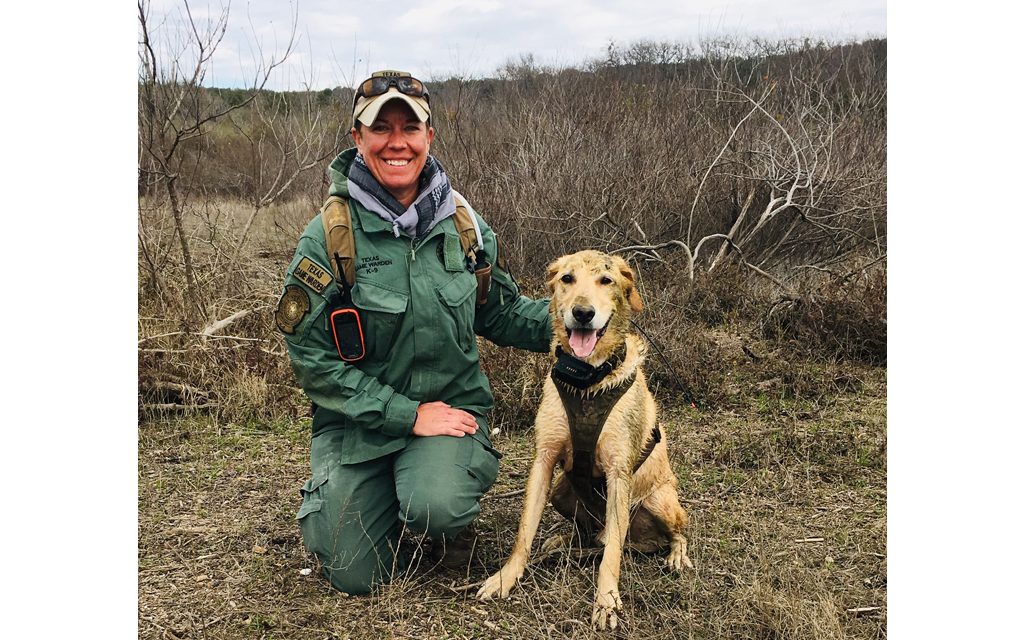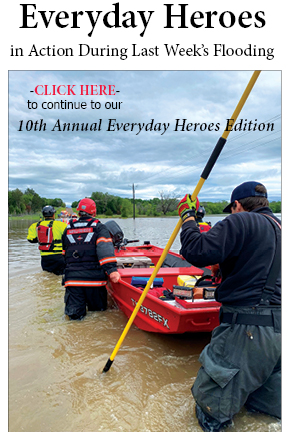by John Jefferson
At the January Texas Parks and Wildlife (TPW) Commission meeting, two new wardens received their badges. One was named “ Ruger”, the other “Bosch”. Those weren’t code names; they were their real names. The badges were attached to their collars; they’re members of the TPW K-9 team.
Focused elsewhere in the room as I approached on the far end of photographers, Ruger jerked his head around and visually locked onto me. My clothes probably carried scent from my dog, named “Ruger”. He recognized something.
The K-9 Unit was established in 2013 and trained in search and rescue, narcotics detection, wildlife recovery and gunpowder residue detection.
Dogs have unique and powerful senses. Hunters know that. It makes sense for law enforcement to utilize dogs’ talents in their work. A recent case involved a suspect wardens were seeking that had disappeared into the woods. Instead of spending hours searching for him, a K-9 unit was called into duty — quickly and safely locating the suspect.
Ruger’s human partner, Warden Captain Christy Vales, tells of them assisting other wardens, but also the FBI, DEA, Homeland Security, Border Patrol, Texas Rangers and local law enforcement. Together, they have located missing persons, tracked down poachers, recovered narcotics, currency and even firearms. She mentioned an extraordinary case where Ruger unearthed a handgun hidden in a wooded area for two years that had been used in an aggravated assault!
K-9 Ruger can locate articles bearing human scent, like cell phones. Wish MY Ruger could!
A special new skill is locating cadavers on land and under water, the latter involving scent from bubbles coming to the surface.
None of this just happens overnight without training, both for the dogs and their handlers. Until recently, all members of the K-9 Unit, dogs and humans, attended special training at Utah Peace Officer Standards and Training. Captain Vales and Ruger were in the first group from Texas to attend, learning narcotics detection. They later returned to become certified in Police Search and Rescue (PSAR). Each discipline requires eight weeks of training. It’s not just a sit-and-stay obedience class.
But it doesn’t end there. Each discipline (wildlife detection and PSAR) requires 16 hours of training per month. And they must annually certify in each. The K-9 Unit now has its own instructors and is qualified to train new handlers here. Capt. Vales is quick to point out, though, that they are most appreciative of the training and hospitality they received in Utah.
Christy Vales came to TPWD from the Air Force. There, she was in law enforcement, but wasn’t a dog handler. She did, however, volunteer in the K-9 kennels and even helped train wearing the “bite suit”. She became a game warden in 2007 and is now the K-9 Unit Captain.
There are currently vacancies for two K-9 teams. Each will include a K-9 and a handler. The humans will be selected from existing warden applicants with at least one year of service.
The K-9 Unit has a bright future.
JJ





